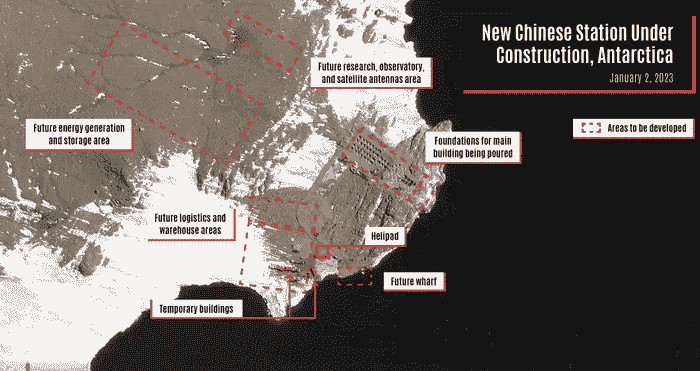
According to fresh satellite data gathered by a Washington-based think tank, China is expanding its fifth station in the Antarctic footprint.
The data suggests that work has started again on the country’s fifth station in the southern polar region for the first time since 2018.
Strategy to Gather Signals to Other Country
Beijing has pushed to extend its research in Antarctica and create new commerce routes in the Arctic, but Western nations are concerned that Beijing’s growing polar presence could provide the People’s Liberation Army (PLA) with improved monitoring capabilities.
The Center for Strategic and International Studies (CSIS) stated in a research that the new station, on Inexpressible Island near the Ross Sea, is anticipated to have an observatory with a satellite ground station and should assist China in filling in a major gap in its ability to access the continent.
The 5,000 sq meter (53,820 sq ft) station’s new support buildings, temporary structures, a helicopter pad, and the foundations for a larger main facility were all identified by CSIS using satellite pictures collected in January. By 2024, it was predicted that the construction would be finished.
The station is strategically located to gather signals intelligence over Australia and New Zealand as well as telemetry information on rockets launched from Australia’s new Arnhem Space Centre.
The station will eventually have a dock for China’s Xuelong icebreaker ships.
Read more: Minnesota: Direct payments, social security tax cuts, and new credits for families

Inspections of the Station
A team of US inspectors came to the station for a visit in February 2020, and Wang Zhechao, the station’s manager from the Chinese Polar Research Institute, graciously hosted them.
According to a summary of the inspection released by the US State Department, they did not discover any military hardware or support personnel at the location.
Based on a 2018 draft Comprehensive Environmental Evaluation about the project submitted by China to an Antarctic Treaty Consultative Meeting, the scientific research at the station once it is finished will be focused on physical and biological oceanography, glaciology, marine ecology, zoology, atmospheric and space physics, and geology.
Read more: Google AI chatbot bard draws criticism for misleading responses and inaccuracy

